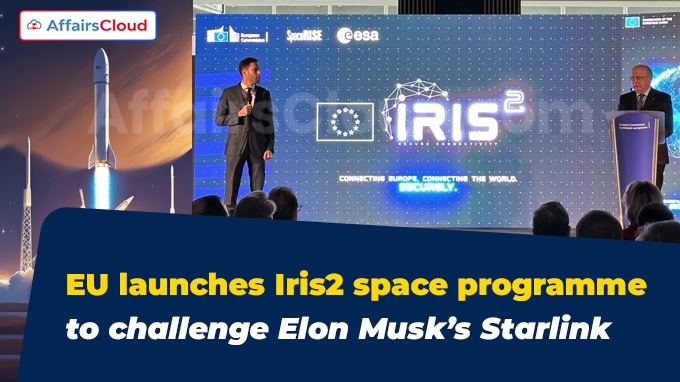 On December 19 2024, the European Union(EU) introduced the Euro 10 billion (USD 11 billion) ‘Infrastructure for Resilience, Interconnectivity and Security by Satellite(IRIS²) space program’ initiative, aimed at deploying a network of 290 satellites in low and medium Earth orbits. The project was developed with the collaboration of Space Consortium for a Resilient, Interconnected and Secure Europe (SpaceRISE).
On December 19 2024, the European Union(EU) introduced the Euro 10 billion (USD 11 billion) ‘Infrastructure for Resilience, Interconnectivity and Security by Satellite(IRIS²) space program’ initiative, aimed at deploying a network of 290 satellites in low and medium Earth orbits. The project was developed with the collaboration of Space Consortium for a Resilient, Interconnected and Secure Europe (SpaceRISE).
- The constellation will comprise of 264 Low Earth Orbit (LEO) and 18 Medium Earth Orbit (MEO) satellites and is expected to be in service in 2030.
- The full deployment of the satellite network is expected to unfold over a 12-year period.
Signatories:
An agreement was signed between SpaceRISE, a consortium made up of Eutelsat, Hispasat, and SES, the European Commission (EC) and the European Space Agency (ESA) during a ceremony at the European Commission headquarters in Brussels(Belgium).
- Under the agreement with SpaceRISE, the project will receive euro 6.5 billion in public funding, which covers nearly 60% of the total costs.
- This funding comes from the EC, EU Member States, the ESA, as well as private contributions from the consortium members.
- Eutelsat is the largest private investor, committing Euro 2 billion to the project.
About IRIS² program:
i.IRIS² represents the EU’s third major satellite initiative, following Galileo and Copernicus.
- The program will not only bolster Europe’s security but will also serve as a critical tool in the EU’s long-term strategy for digital autonomy.
ii.IRIS² was launched to reduce Europe’s dependency on non-European satellite networks, ensuring secure communication and surveillance capabilities for its member states.
iii.The IRIS² satellites will operate in MEO and LEO, covering Europe and surrounding regions to ensure comprehensive communication and surveillance capabilities.
iv.The United Kingdom(UK) has opted not to participate in the IRIS² project, having chosen to establish its own satellite systems following Brexit.
Program Implementation:
i.The program will be supported by leading European companies in the aerospace and telecommunications industries, such as Airbus Defence and Space, Deutsche Telekom, Thales Alenia Space (France), and Telespazio (Italy).
- These companies will help design, manufacture, and operate the satellite constellation, ensuring the project’s success.
ii.The satellites will be a mix of high- and low-powered systems, providing the equivalent capability of 1,000 satellites, similar to Starlink, a satellite internet constellation operated by Starlink Services, LLC.
Key Objectives :
- Digital Sovereignty: To reduce reliance on foreign space-based communication systems by building a self-reliant satellite network.
- Secure Connectivity: Provide secure, uninterrupted communication services for government operations and military forces.
- Cybersecurity Enhancement: The satellites will play a pivotal role in safeguarding critical infrastructure from cyber threats.
- Commercial and Military Use: The program intends to offer subleased communication services for both commercial and governmental applications.
About European Union:
The European Union (EU) is a political and economic union of 27 member states in Europe:
Austria, Belgium, Bulgaria, Croatia, Cyprus, Czech Republic, Denmark, Estonia, Finland, France, Germany, Greece, Hungary, Ireland, Italy, Latvia, Lithuania, Luxembourg, Malta, The Netherlands, Poland, Portugal, Romania, Slovakia, Slovenia, Spain and Sweden
Headquarters- Brussels, Belgium
Established – 1993




